Your Personalized Detox Blueprint: Genetics, Testing & Lifestyle Support

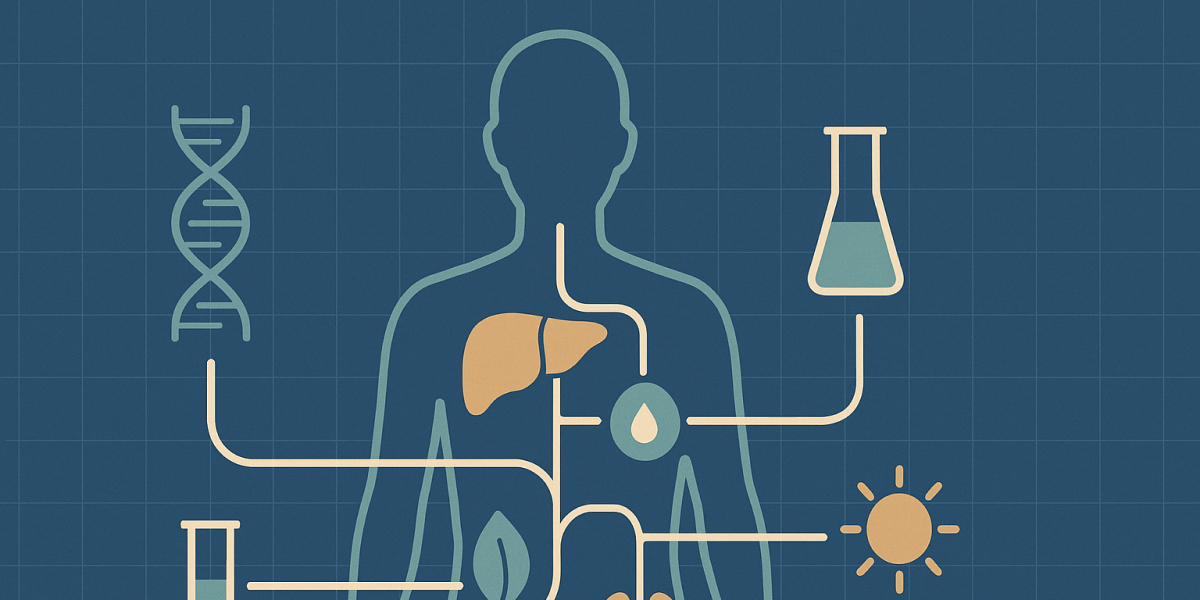
We've covered a lot of ground in this series. Phase I transforms toxins into reactive intermediates. Phase II neutralizes those intermediates through six conjugation pathways. Phase III eliminates the conjugated toxins and protects you from oxidative damage. Each phase is essential, needs specific nutrients, and is influenced by your unique genetic blueprint.
Now let's bring it all together and answer the big questions, how do you know if your detoxification system needs support? What do your genetics tell you about your vulnerabilities? And most importantly, what do you actually DO with all this information?
The Pattern You Can't Ignore
As you've read through this series, the same interventions keep showing up. Whole foods. Quality protein. Cruciferous vegetables. B vitamins. Magnesium. Selenium. Zinc. Hydration. Movement. Sleep. Stress management. Limited alcohol. Reduced toxic exposures.
These aren't different recommendations for each phase. They're the SAME recommendations supporting ALL phases. And here's why that's incredible news, you don't need 50 different protocols. You need five to seven core interventions done consistently.
The Fundamentals That Support Every Phase
If there's one insight that should change how you think about detoxification, it's this, the same foundational interventions support Phase I, Phase II, and Phase III simultaneously. Your body's systems are interconnected. When you support one pathway, you're almost always supporting multiple others.
This means optimization isn't complicated. It's about mastering the fundamentals. Here's what matters:
Quality protein (0.7-1g per pound of ideal body weight daily): Provides amino acids for Phase I CYP enzymes, all six Phase II conjugation pathways, Phase III transport proteins, and antioxidant enzyme production. You cannot detoxify without adequate protein.
B vitamin complex (especially B6, B12, folate, B2, B3, B5): Required for Phase I enzyme function, Phase II conjugation (particularly methylation and glutathione production), antioxidant enzyme support, and energy production for Phase III transporters.
Magnesium (400-600mg daily from food and supplements): Cofactor for over 300 enzyme systems including Phase I CYPs, Phase II conjugation, Phase III transporters, and antioxidant defenses. Most people are deficient.
Cruciferous vegetables (daily servings): Support Phase I activity, boost Phase II glutathione and sulfation pathways, activate NRF2 for Phase III antioxidant defense. True detox superstars.
Antioxidant support (particularly glutathione/NAC and vitamin C): Protects against Phase I oxidative stress, supports Phase II glutathione conjugation, strengthens Phase III antioxidant defenses. Given our unprecedented toxic load, supplementation often makes sense.
Adequate hydration (minimum half your body weight in ounces daily): Necessary for Phase III elimination through urine, supports bile flow for stool elimination, helps with toxin transport.
Regular movement and sweating: Supports lymphatic drainage, opens Phase III elimination through sweat, improves mitochondrial function for energy-dependent transporters. Aim for 80% Zone 2 (easy conversational pace) and 20% Zone 4/5 (high intensity) training, which we'll explore in depth in a future series.
Fiber (25-35g daily): Binds toxins in the gut for Phase III elimination through stool, prevents enterohepatic recirculation, supports healthy gut bacteria. This is why psyllium husk supplementation (1-2 tablespoons daily) is such a powerful tool, especially if you struggle to get enough fiber from food alone.
Quality sleep (7-9 hours): Liver does most intensive detox work at night, antioxidant systems regenerate during sleep, mitochondria repair and produce energy for transporters.
This is the foundation. Everyone needs these basics regardless of genetics. Genetics just help you understand where you might need extra emphasis.
Your Genetic Blueprint: Understanding Your Variants
Your genes load the gun, but your lifestyle pulls the trigger. Genetic variants don't doom you to poor detoxification. They reveal where your system might need additional support or where you're more vulnerable.
Throughout this series, we've covered the major genetic variants that affect detoxification. Rather than repeat that detail, let's summarize what matters and how to think strategically about your genetics.
The Key Genetic Areas
Phase I variants (The Transformer "Phase I": How Your Liver Activates the Cleanup Process): CYP genes like CYP1A1, CYP1A2, CYP1B1, CYP2E1, CYP2D6, and CYP3A4 determine how fast or slow you transform compounds. Fast isn't always better. It can create reactive intermediates faster than Phase II can handle.
Phase II variants (The Neutralizer “Phase II”: Making Toxins Water Soluble for Exit): GST genes (particularly GSTM1 and GSTT1 deletions), UGT genes, SULT variants, MTHFR and COMT for methylation, and NAT2 for acetylation all affect how efficiently you neutralize toxins. About 50% of people have GSTM1 deletions. Around 40% carry MTHFR variants. These are common.
Phase III variants (The Elimination Highway "Phase III": Getting Toxins OUT): Transporter genes like ABCB1/MDR1 and antioxidant enzyme genes like SOD2 and GPX1 affect elimination and oxidative stress protection.
What Your Genetics Actually Tell You
Your genetic variants reveal three things:
Where you need extra nutritional support: MTHFR variants mean you need methylated B vitamins. GST deletions mean glutathione support becomes essential. SOD2 variants mean manganese and antioxidant emphasis matters more.
Where you're more vulnerable: Slow CYP1A2 means higher caffeine sensitivity. GSTM1 deletion means higher vulnerability to environmental toxins. Slow NAT2 means tobacco smoke and charred meats are particularly risky.
Where lifestyle modifications matter most: Slow estrogen metabolism genes (CYP1B1, UGT, COMT) mean reducing xenoestrogen exposure from plastics becomes more critical. Transporter variants mean ensuring daily bowel movements is non-negotiable.
Assessing Your Detoxification Capacity
Beyond genetics, how do you know if your detoxification system needs support? Your body tells you. You just need to know what to listen for.
Your Body's Warning Signs
Most people with detoxification issues share a common pattern. These aren't vague complaints. They're specific signals that one or more phases is overwhelmed.
The hallmark sign is chemical sensitivity. If fragrances give you instant headaches, if new furniture off gassing makes you sick, if you can't tolerate conventional cleaning products, your detox system is struggling. This isn't psychosomatic. It's Phase I creating reactive intermediates faster than Phase II can neutralize them, or Phase III not eliminating efficiently.
Medication and supplement reactions at normal doses are another clear signal. If you consistently need lower doses, experience unusual side effects, or find that supplements make you feel worse, your CYP enzymes or conjugation pathways aren't processing compounds efficiently.
Hormone imbalances, particularly estrogen dominance in women, often point to impaired Phase II glucuronidation or sulfation. Heavy periods, PMS, breast tenderness, fibroids, and difficulty losing weight around the hips can all indicate poor estrogen elimination. For men, low testosterone with estrogen symptoms (gynecomastia, difficulty building muscle, fat accumulation) signals the same issue.
Chronic fatigue despite doing everything right often reflects oxidative stress overwhelming your Phase III antioxidant defenses. Your mitochondria are taking damage faster than they can repair.
And then there's the gut connection. Chronic constipation or fewer than one bowel movement daily means your Phase III elimination is compromised. Toxins sit in your colon, potentially being reabsorbed through enterohepatic recirculation.
Why Age Exposes What Youth Hid
You might have had genetic variants affecting your detoxification pathways your entire life, but you're only noticing problems now. This isn't because the variants suddenly appeared. It's because aging reduces your overall detoxification capacity, and what your body could compensate for at 25, it can't compensate for at 45 or 55.
When you're younger, your body has reserves. Your mitochondria are more efficient. Your antioxidant production is more robust. Your liver enzymes are more active. Even if you had GSTM1 deletions or slow MTHFR variants, your youthful biology could work around these limitations.
But as you age, glutathione production naturally declines. Mitochondria become less efficient and produce more oxidative stress. Phase I and Phase II enzyme activity decreases. Antioxidant regeneration slows. NAD+ levels drop, affecting hundreds of enzymatic processes. Chronic stress and years of toxic accumulation take their toll.
This is why people say "I used to be able to drink wine with no problem" or "I never had issues with fragrances until my 40s" or "My periods were fine until recently." The genetic variants were always there. Declining detox capacity with age just unmasked them.
The good news? Targeted support becomes even more impactful as you age. The fundamentals aren't optional anymore. That glutathione support you might have gotten away without in your 20s becomes essential in your 40s and beyond. The methylated B vitamins that seemed unnecessary before now make a noticeable difference. Supporting what naturally declines with age isn't just anti-aging. It's pro functioning.
When Testing Makes Sense
You don't always need testing. If you implement the fundamentals and feel dramatically better within 30 days, you have your answer. Your detox system needed nutritional support, and you gave it.
But if symptoms persist despite foundational support, or if you want to understand your specific genetic vulnerabilities, testing provides valuable insights.
Genetic testing is the most informative starting point because it's a one-time investment that gives you a permanent blueprint. Companies offering detox-focused genetic panels can identify your CYP variants, GST deletions, MTHFR status, COMT activity, and antioxidant enzyme variants.
Organic acids testing measures metabolic byproducts in urine and can reveal nutrient deficiencies, oxidative stress levels, and mitochondrial function. It's particularly useful for identifying specific Phase II pathway issues.
Comprehensive stool testing (often referred to a Gut Microbiome testing) becomes critical if you suspect gut involvement. Measuring beta-glucuronidase activity tells you if your gut bacteria are reversing glucuronidation and sending toxins back into circulation. This is especially important for hormone issues that don't respond to typical interventions.
Hormone metabolite testing, particularly estrogen metabolism through dried urine testing, can show exactly how you're breaking down estrogen and whether problematic metabolites are accumulating.
Work with a functional medicine practitioner to choose the right tests for your situation. Not everyone needs every test. Strategic testing based on your symptoms is the smart approach.
The 30-Day Foundation Challenge
Before spending money on testing or complex protocols, try this. Commit fully to the fundamentals for 30 days and track how you feel. Keep a simple journal noting energy levels, brain clarity, digestive function, sleep quality, and other symptoms.
The non-negotiables for 30 days:
Make sure you're hitting these targets every single day. Not most days. Every day.
Quality protein at every meal, aiming for 0.7 to 1 gram per pound of ideal body weight. Track it for the first week to see if you're actually hitting this target. Most people aren't.
At least one serving of cruciferous vegetables daily. Broccoli, cauliflower, Brussels sprouts, kale, cabbage, bok choy. Non-negotiable.
Fiber intake of 25 to 35 grams daily. If you're not getting this from food, add psyllium husk (1-2 tablespoons daily in water).
At least one well-formed bowel movement every single day. If you're not achieving this, it's your first priority. Increase fiber, increase water, add magnesium, do whatever it takes.
Half your body weight in ounces of water daily as a baseline. More if you're exercising or sweating.
A quality B complex with methylated forms if you know or suspect MTHFR variants. If you don't know, start with methylated anyway since it works for everyone.
Magnesium glycinate, 400mg before bed. Most people are deficient and this supports hundreds of detox-related enzyme systems.
Seven to nine hours of actual sleep, not just time in bed. Your liver does its most intensive detox work at night.
At least 30 minutes of movement that makes you sweat, most days of the week.
Alcohol limited to two to three drinks per week maximum.
After 30 days, reassess. If you feel dramatically better, you know the fundamentals were your issue. If you've improved but still have significant symptoms, that's when testing and targeted interventions make sense. But start with the foundation. Most people never actually do the basics consistently enough to know if that's all they needed.
Building Your Personalized Protocol
Based on your genetics, symptoms, and testing, here's how to create your personalized detox support plan:
The Universal Foundation (Everyone)
These are the basics regardless of genetics:
- Whole food, nutrient-dense diet emphasizing protein and vegetables
- Daily cruciferous vegetables
- Quality B complex (methylated if MTHFR variants)
- Magnesium glycinate (400-600mg)
- Adequate hydration
- Regular bowel movements (address constipation aggressively)
- Movement and sweating
- 7-9 hours sleep
- Stress management practices
- Reduced toxic exposures where controllable
Layer 1: Antioxidant and Glutathione Support
Given our unprecedented toxic burden (remember those 350,000 chemicals?), most people benefit from:
- NAC (600-1800mg daily) for glutathione support
- Vitamin C (1000-2000mg daily) for antioxidant protection and glutathione regeneration
- Liposomal glutathione (2-3x weekly)
- Selenium from Brazil nuts (2-3 daily) or supplement (200mcg)
Increase emphasis if: You have GSTM1/GSTT1 deletions, GSTP1 slow variants, GPX1 reduced function variants, SOD2 variants, high toxic exposures, or chronic oxidative stress symptoms.
Layer 2: Methylation Support
If you have MTHFR variants, slow COMT, or methylation-related symptoms:
- Methylated B complex (ensure 400-1000mcg 5-MTHF, 500-1000mcg methylcobalamin)
- Betaine/TMG (500-1000mg daily) as additional methyl donor
- Adequate B6 (25-50mg) and B2 (25-50mg) to support the methylation cycle
- Choline from eggs or supplement (250-500mg)
- Consider SAMe (200-400mg) for additional support, especially if slow COMT
Layer 3: Phase-Specific Support
Based on your genetic variants and symptoms:
If Phase I is fast or you have high toxic exposure: Extra antioxidants (vitamin C, E, carotenoids), ensure robust Phase II support, consider milk thistle or NAC for liver protection.
If Phase II glucuronidation is slow (UGT variants) or you have hormone issues: Calcium D-glucarate (500-1000mg daily) to prevent enterohepatic recirculation, adequate complex carbohydrates, support gut health, magnesium.
If Phase II sulfation is slow (SULT variants): Emphasize sulfur-rich foods daily, consider MSM (1000-2000mg) or N-acetyl cysteine, ensure adequate molybdenum.
If Phase III elimination is compromised: Prioritize fiber (consider psyllium or ground flaxseed supplementation), support bile flow with bitters or healthy fats, ensure daily bowel movements (magnesium, vitamin C to bowel tolerance), regular sauna use, consider binders like activated charcoal occasionally (away from food and supplements).
Layer 4: Lifestyle and Exposure Management
Beyond nutrition and supplementation, lifestyle choices either support or undermine your detoxification system. This isn't about obsession. It's about being strategic with exposures you can control.
You can't eliminate all toxic exposures. But you can dramatically reduce your total burden by making smarter choices where you have agency. Every reduction in toxic input means less work for your detox system.
Choose organic for foods you eat most frequently, particularly animal products and high-pesticide produce. If you eat eggs daily, buying organic eliminates daily pesticide exposure. Filter your water. Switch to simpler, fragrance-free personal care products. These are high-impact changes that meaningfully reduce your burden.
Alcohol deserves honest consideration. It taxes every phase of detoxification, depletes glutathione, and creates oxidative stress. If your detox system is struggling, recognize the trade-offs.
And stress management isn't optional. Chronic stress depletes antioxidants, impairs methylation, and reduces glutathione production. Your body can't detoxify efficiently in constant fight-or-flight mode.
The goal isn't perfection. It's reducing your total toxic burden enough that your detox capacity can handle what remains.
The Big Picture: Why This Matters Now More Than Ever
Our detoxification systems evolved over millions of years. Until about 80 years ago, they handled natural compounds, our own metabolic waste, and occasional environmental exposures. The system worked beautifully.
Then we introduced 350,000 synthetic chemicals into our environment in the blink of an evolutionary eye. Chemical production increased fifty-fold since 1950 and is projected to triple again by 2050. We all carry hundreds of these chemicals in our bodies that didn't exist in our grandparents' generation.
Your detoxification system is working harder than it ever has in human history. This isn't about being extreme or obsessive about "toxins." It's about recognizing reality and giving your body the support it needs to handle an unprecedented burden.
The good news? The fundamentals work. You don't need dozens of exotic supplements or extreme protocols. You need consistent attention to nutrient-dense whole foods with adequate protein, key nutrients (B vitamins, magnesium, antioxidants), strategic supplementation in a few areas (glutathione/NAC, methylation support for some), open drainage pathways (daily bowel movements, hydration, sweating), reduced toxic exposures where controllable, and adequate sleep and stress management.
Your genetics help you understand where to emphasize or add targeted support. But the foundation is the same for everyone. And that foundation, done consistently, is incredibly powerful.
The Empowering Truth
Your body already knows how to detoxify. You don't need to "cleanse" or do extreme protocols. You need to support the elegant, sophisticated system that's already working 24/7 in every cell of your body.
Give it the nutrients it needs. Keep the drainage pathways open. Protect it with antioxidants. Reduce unnecessary toxic burden where you can. Get adequate sleep. Manage your stress. These aren't complicated or expensive interventions. They're fundamentals that support not just detoxification but every system in your body.
Your genetics provide the blueprint. Your lifestyle and nutrition provide the support. And together, they determine how well your body handles the unprecedented chemical world we all live in.
You've got this. Your body is more resilient and capable than you probably realize. Now you understand how to work with it, not against it, to optimize one of the most critical systems for long-term health and vitality.



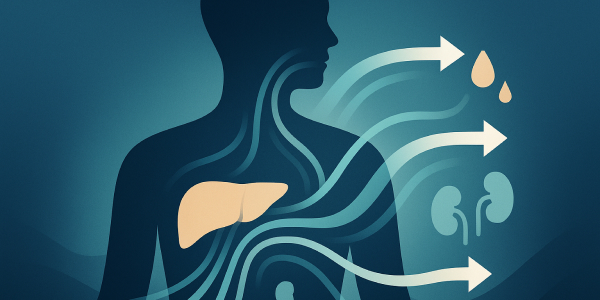
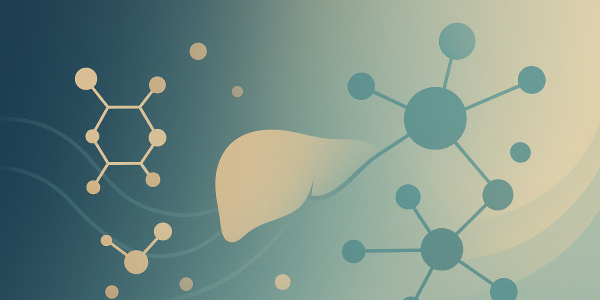


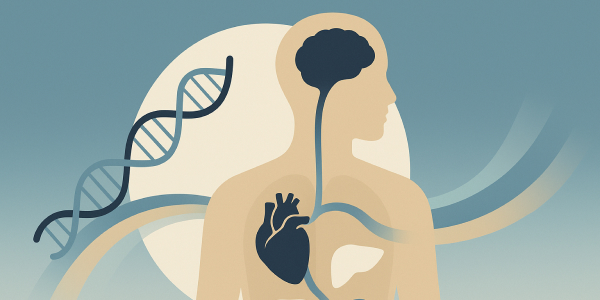
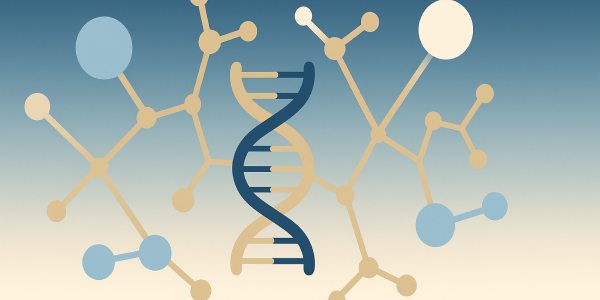

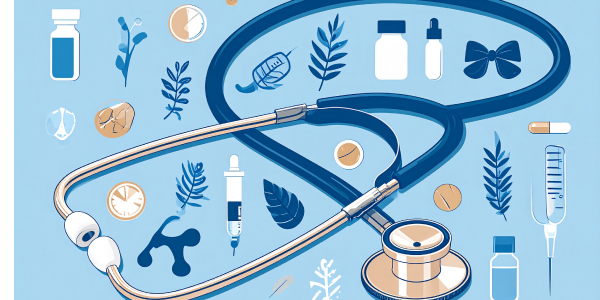
.svg)